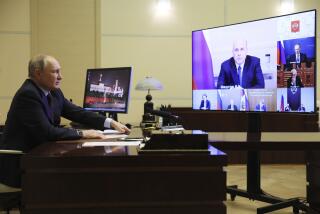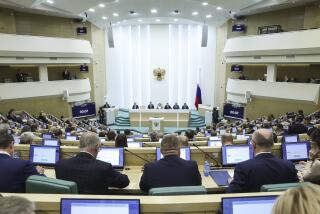Symbol of a Shambles
- Share via
The Soviet government’s announcement that it will resume nuclear testing if the United States sets off any more nuclear explosions may, more than anything else, represent a concession by Soviet leader Mikhail S. Gorbachev to impatient military men. Provided that the Reagan Adminisration responds in sensible fashion, however, it does not necessarily diminish the chances for a broad agreement to reduce nuclear arms.
The idea of a total ban on nuclear testing has a powerful symbolic appeal to a world that desperately wants an end to the nuclear-arms race; the Administration’s flat refusal even to consider such a ban was a mistake.
Even some of the nation’s most ardent arms-control experts do not feel, however, that efforts to achieve a total test ban should be given priority over more fundamental objectives--specifically, the negotiation of significant reductions in offensive nuclear weapons.
Test-ban advocates like to believe that a halt in testing would force an end to the development of new nuclear weapons. That is no longer the case. Although both the U.S. and Soviet defense establishments would rather test than not test, the use of sophisticated simulation techniques would allow new weapon programs to go forward in both countries, though perhaps with less confidence.
It’s also worth remembering that a complete and permanent ban on underground nuclear testing cannot merely be declared but must be negotiated, and such negotiations tend to be long and complex.
Before the Reykjavik summit in October, President Reagan promised under pressure to submit two nuclear-test treaties negotiated in the 1970s to the Senate for ratification, with the agreements to take effect on Soviet acceptance of additional verification measures. He also proposed that negotiations begin on incrementally limiting and ultimately ending nuclear testing in lockstep with reductions in the nuclear arsenals on both sides.
Gorbachev agreed at Reykjavik to consider the incremental approach. And while the Soviet announcement last week proposed immediate negotiations on a total test ban, it said that interim limits on the number and yield of tests would be acceptable as a start. Negotiations toward this end should be included in the Geneva arms-control talks, which will resume in January.
In a meeting with Sen. Gary Hart last week, Gorbachev said that, despite the loss of momentum in the arms-control talks since the summit meeting, he is still interested in reaching early agreement. Hart also picked up indications, not borne out so far by the posture of Soviet negotiators in Geneva, that Moscow may be willing to compromise on its definition of allowable strategic defense research under the 1972 anti-ballistic-missile treaty.
Before the Reykjavik summit meeting broke up in disagreement over the “Star Wars” issue, Reagan and Gorbachev had reached tentative agreement on deep cuts in offensive missiles within five years. Common sense tells you that the Administration should return to Geneva with a new willingness to accept restraints on its Strategic Defense Initiative in order to nail down this agreement. If this fundamental goal can be achieved, the practical possibilities of working out a comprehensive nuclear-test ban will be greatly enhanced.
The big question, unfortunately, is whether a beleaguered Reagan, preoccupied with the scandal over arms sales to Iran, will be any more disposed toward compromise on SDI than he has been for the last three years. If he is not, negotiations on the broader issues in arms control will remain deadlocked. Then the missed opportunity for a nuclear-test ban will loom even larger as a symbol for a frustrated world.
More to Read
Sign up for Essential California
The most important California stories and recommendations in your inbox every morning.
You may occasionally receive promotional content from the Los Angeles Times.













